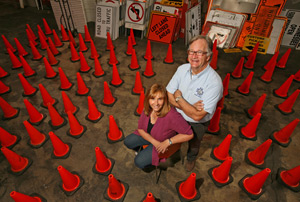Film shoots are a familiar sight in Los Angeles. They’re recognizable by rows of equipment trucks, trailers and crowds of people. And sometimes they require road closures.
That’s when production companies call JCL Barricade Co., which specializes in traffic control for the film industry. In 14 years, the company has grown from a husband-and-wife team working out of a backyard in West Covina to a 14-person operation in a 12,000-square-foot warehouse near downtown Los Angeles. Revenue has increased every year except 2008 and now totals more than $3 million.
Chief Executive Jim Morris was once a security guard on film locations, then worked as a location manager. During that time, he discovered traffic control for shooting was an underserved niche. In 1997, he and his wife, Susan, decided to fill that need and launched their company.
Jim Morris recalled that at the time, there were only two other companies offering traffic control: one that charged very high rates and one that charged low rates but provided minimal service. He decided to enter the market as a midprice alternative.
“It’s a genuine niche industry in that there are many traffic control companies but only three target the motion picture industry,” he said.
Contracting for traffic control requires cones, signs, barricades and the trailers to bring them to the shoot. To finance equipment purchases, Susan Morris signed the couple up for every available credit card and maxed them out. At one point, the couple was juggling $90,000 in plastic debt to fuel the company’s growth.
“It sounds horrible, but we knew the money was coming and it did,” Jim Morris said. “This wasn’t extravagant, it was $90,000 of revenue-producing equipment.”
The niche is regulated by the California Department of Transportation. When JCL launched, Caltrans simply required that traffic control workers wear hardhats. But within a few years, the regulation changed to require a contractor’s license, which requires five years of experience, raising a significant barrier to entry for new competitors.
Mike Fantasia, an independent location manager, said he’s been impressed with the Morrises’ service on productions including “Catch Me If You Can,” “Seabiscuit” and “The Green Hornet.”
“In this business we change our minds all the time,” Fantasia said. “On some of these shoots we’ve changed the plan 30 or 40 times and every time JCL complied, often without charging.”
JCL grew consistently for a decade, but hit a crisis with the writers strike of 2007-08. Movie and TV filming in Los Angeles ground to a halt. The company survived by finding work with special events and TV commercials. It avoided laying off workers by reducing hours. JCL workers normally put in 60-hour weeks, but during the strike they were only putting in 24 hours. The slowdown prompted Jim Morris to look beyond his movie business niche.
“We had to look elsewhere for growth, so I decided on special events and mainstream construction projects,” he said. “I had little experience in those fields, so we brought in David Campos, a professional who had worked for a bankrupt traffic control company in San Bernardino in construction. With his skills, we have made significant headway into that industry.”
When the writers strike ended, Morris moved into making custom signs pointing the way to a movie or TV shoot. Morris figures he now makes 80 percent of those signs around Los Angeles, in addition to other signs for parking lots and small businesses.
TV and movies
On any given day, JCL crews are working three or four projects. Last year, the company worked on TV shows such as “House,” “The Office” and “CSI: New York.” Recent film projects include “Social Network” and “Green Hornet.”
A typical job might involve taking the right lane of a major street for parking a movie’s equipment trucks, or closing a street and diverting traffic. JCL’s fee for a street closure ranges from $500 to $2,400 a day, depending on traffic flow.
Ernest Doud, president of business consultancy Doud Hausner & Associates in Florence, Ore., said niche businesses are great as long as that industry remains healthy. In the case of film location work in Los Angeles, statistics point to a long-term decline as productions move elsewhere to take advantage of lower costs.
“If I’m serving a niche that is declining, I have to ask who else needs traffic control?” Doud said.
Morris said that filming still accounts for 75 percent of his revenue, with the rest coming from branching out into construction, special events and signs.
The biggest project for JCL is the Orange County Marathon, which features a 26.2-mile route through five cities that crosses hundreds of streets.
JCL uses all its equipment plus rentals. The tally includes 2,500 orange cones, 1,200 no-parking signs, 650 street barricades, 50 detour signs, 42 water-filled traffic barriers and 20 electronic message boards.
Although JCL has grown big by filling niche markets, Morris knows it’s not a fail-safe strategy. At one point in 2006, he decided to start an apparel manufacturing company in downtown Los Angeles. But it lost significant money that could he could have used to build up JCL.
In retrospect, he attributes that failure to ignorance about the niche he was entering.
“The most important thing is to explore niches without laying out a tremendous amount of capital,” Morris said. “Just choose the niches carefully where you really think it will work out. If you don’t know a particular business, you should know it’s not going to work out.”
JCL Barricade Co.
Year Founded: 1997
Headquarters: Downtown Los Angeles
Core Business: Traffic control services for movie productions and special events.
Employees: 14
Goals: To expand into related markets such as signage and construction projects.
The Numbers: The company charges $2,400 per day for traffic control when a major street is closed for filming. Annual revenue of more than $3 million.

